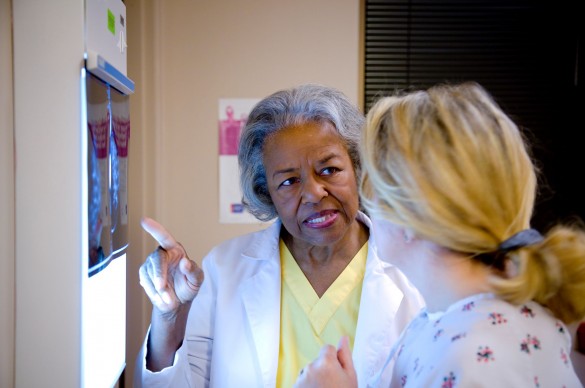This October, during Breast Cancer Awareness Month, we reflect on our efforts to reduce the breast cancer burden nationwide and continue our commitment to fighting the second leading cause of cancer death for women in the United States.
An estimated 266,120 women in the U.S. are expected to be diagnosed with breast cancer in 2018, making it the most commonly diagnosed cancer among women. The prognosis for breast cancer is strongly influenced by the stage of the disease when the patient is diagnosed. When diagnosed at later stages, survival is less likely and costs of treatment are higher. However, over one in three women are not getting screened as recommended, which in part contributes to only 62 percent of breast cancers being diagnosed at an early, local stage.
Getting screened early can save lives from breast cancer, but lack of health insurance poses a major barrier to breast cancer screening. Millions of low-income, uninsured and underinsured women depend on the National Breast and Cervical Cancer Early Detection Program (NBCCEDP), a Centers for Disease Control and Prevention (CDC) program, for access to breast and cervical cancer screenings and diagnostic services. However, the NBCCEDP can currently only serve one in every 10 eligible women due to underfunding of the program.
- ACS CAN advocates for increased and protected federal funding for the NBCCEDP, as well as for states to appropriate $1 for every $3 in federal funds toward the program, to ensure that uninsured and underinsured women have access to potentially lifesaving screenings. We were pleased last month when Congress recognized the important role of cancer prevention and early detection programs at the CDC by maintaining $197 million in level funding for these programs for Fiscal Year 2019.
- ACS CAN also advocates for increases in funding for community health centers as well as evidence-based educational efforts to improve uptake of preventive and early detection services.
- ACS CAN supports policies that require insurers to cover recommended breast cancer screenings beginning at age 40 without patient cost sharing.
Disparities exist across the cancer continuum, and breast cancer is no exception. The ACS CAN report Cancer Disparities: A Chartbook, released this week, illustrates health disparities throughout the cancer continuum, including cancer incidence, mortality , and survival; access to insurance coverage; screening and early detection; and the behaviors that may increase risk. The following are some of the breast cancer-specific disparities included in the Chartbook:
- Although non-Hispanic White (NHW) females have slightly higher incidence rates for breast cancer, non-Hispanic Black (NHB) females have higher mortality rates than NHW females. This mortality disparity largely reflects striking inequalities in stage distribution and access to and receipt of high-quality cancer treatment among NHB, as well as other factors such as comorbidities, differences in screening, lack of timely follow-up of abnormal results, and response to treatment.
- Women of Hispanic and Asian descent and American Indian/Alaska Natives are less likely to be up-to-date with recommended breast cancer screening tests than White or Black women. Multiple factors contribute to disparities among screening, including differences in insurance and access to care, as well as structural and cultural barriers.
- Women who are insured are twice as likely to receive a recommended mammography than women who are uninsured.
ACS CAN recognizes Breast Cancer Awareness Month with our continued support for funding to ensure all women have access to recommended, screening, treatment and follow-up care. All Americans should have access to the potentially lifesaving care they need, and we’ll work this month and year-round to make that happen.

